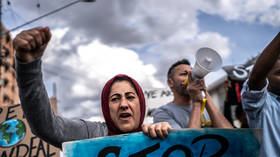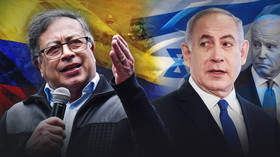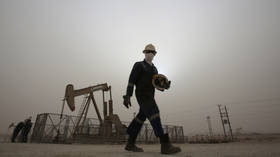Timofey Bordachev: The global majority is shocked by the hypocrisy of the West in the Israel-Palestine conflict

We in Russia are very fond of appealing to such a concept as the “global majority” – these are countries of the world that link their development to the main trends of globalization, but are capable of expressing their own views on fair forms of international order. Up to now, this notion has been expressed rather discreetly, which is explained by our common participation in a system of relations in which Western countries not only played a leading role, but were also able, until a certain point, to come up with relatively optimal solutions for everyone. Recent events, however – especially the crisis in the Middle East – may open a new chapter in the perception of US and Western European policies by most of the world's countries and create new conditions that will make a return to the previous world order impossible.
Israel's confrontational policy does not directly threaten Russia, the US or China – the great powers of the modern world – and they will not be crossing swords over the future of the Middle East region after the events of this autumn. But it would be short-sighted to underestimate the damaging impact of certain features of the West's chosen position on the credibility of the US and its allies in the eyes of the global community. This means that the conditions under which the international order of the future will emerge are becoming more complex. Let us try to summarize how the countries of the global majority, especially the Islamic part of it, might assess the actions of our American adversaries, their allies in Europe and, most importantly, the consequences of all this for international politics.
As a result of recent discussions with colleagues from the majority countries, it can be said that the most succinct characterization of US behavior is a simple statement: The West is destroying its own previous achievements. The arguments for this assessment go something like this: In recent days, a wave of demonstrations in support of the Palestinians besieged in Gaza has swept the world. While Western leaders have repeated, like a mantra, boilerplate statements of full support and willingness to go to any length for Israel, their own citizens, not to mention the populations of Muslim countries, have protested against a unilateral violent solution to the conflict. These peaceful and so far few actions can reasonably be seen as harbingers of more complex processes that are emerging in the face of the short-sighted policies of the White House and its supporters in Europe.
The most important thing that worries our colleagues in the majority countries of the world is that several narratives that had virtually disappeared in previous years are back on the agenda: The US and the Christian countries of the Old World are primarily responsible for the suffering of Muslims and their destruction in wars and conflicts; they also provoke confrontations that lead to economic crises, hunger, and unemployment in developing countries.
The emergence of such a perception of the West is a complete reversal of the enormous diplomatic efforts made in recent years to strengthen its moral authority. Never mind comments from the likes of EU foreign policy chief Josep Borrell about “gardens” and “jungles.”
No one denies that the US and Western Europe have done much to develop the global market economy. But now, as we can see from the assessments we have heard, they themselves are ruining their own achievements. A large part of the world's population has become convinced of the boundless cynicism and duplicity of the political elites that the vaunted liberal democratic system has placed at the pinnacle of power. Concerned about the current electoral situation and how it will affect their own career ambitions, the present masters of fate don’t hesitate to throw away the enormous achievements of the past years in building trust in international relations and balancing interests at the global level.
Few people now remember how much work has been invested by American and Western European diplomats, governments, and public organizations in supporting various social development programs in Muslim countries, establishing inter-religious tolerance, protecting human rights and promoting other values of the civilized world. The result of the uncomplicated political maneuvering of recent weeks has been, at the very least, an increase in terrorist threats, as confirmed by the numerous warnings issued by the authorities of the United States and other countries to their citizens. A state of extreme polarization and sustained radicalization of citizens' views on religious grounds promises to become the order of the day.
In the future, there is also the possibility of direct Western involvement in a military conflict in the Middle East, which risks becoming very bloody for all participants. I should note that we in Russia are much less aware of the dangers of a possible new division than those colleagues who live and work in Islamic countries, which are particularly sensitive to the challenges of religious radicalism and extremism.
Therefore, the policy of strong support for Israel by the US, and subsequently, the EU, is not only a threat to peace in the Middle East, but also a potential source of tension in a large number of states.
Another concern of the global majority is that the current tense situation in the world will no longer allow anyone to project military force with the same impunity as in the recent past, when world powers recognized each other's “red lines” and respected their opponents. The development of the conflict in Ukraine, accompanied by the unrestrained and open pumping of arms, has ended one of the most successful chapters in human history in terms of building peaceful coexistence between former adversaries. The achievements of dozens of years of development of mechanisms for non-proliferation of arms and implementation of common controls and confidence-building measures have not only been lost, but are irrecoverable. Most countries associated the realization of their basic development goals with the international reality that emerged after the Cold War. It now seems utopian. And it is with this realization that this lost experience will be assessed in the training of new generations of diplomats and military officers.
It is with great bewilderment that leading Western media outlets around the world are reporting in a self-censoring manner, with content tightly controlled on social media sites. Countries that have been subjected to severe hardship and external criticism over freedom of expression sometimes find it hard to find decent words to speak about the standards in reporting the conflicts in Ukraine and Israel. The West's current collective policy on the international stage is increasingly undermining the once phenomenal successes of its soft power. The world of Western fashion and the film industry, which aggressively promotes non-traditional values, is now attracting less and less interest in most countries. The American Dream and Hollywood, instead of inspiring enthusiasm, now often provoke rejection and misunderstanding. The “mainstream” in Western Europe, driven by Washington, is also losing ground.
The world is seeing that, in the West itself, more and more ordinary citizens are asking how much officials across the ocean and in their own countries care about their well-being. The rise of right-wing and left-wing forces and the utter failure of centrist parties speak volumes about the growing dissent against the current state of affairs.
The success of the 20th century, gained through enormous sacrifices, exhausting competition, and long term planning, was forgotten in the two decades of the early 21st century.
Such a wasteful dissipation of its achievements in international politics is leading to the rapid bankruptcy of the West, which easily received the most advantages from the previous system.
Such a squandering of stability and its benefits is certainly unaffordable and not to the liking of the countries of the global majority. It is also unlikely that a situation – in which the West is simultaneously facing the threat of terrorism, involvement in a hot conflict in the Middle East, and geopolitical and geo-economic confrontation with a group of influential world powers – will excite the masses in Western countries.
It is high time to think about the direction in which the construction of a new world order is moving: This is the concern of the majority of the world's countries, which don’t seek to destroy existing rules and norms, but rather want them respected as the basis of international stability. And we in Russia must take these approaches into account even more than our opponents in the West.
This article was first published by Valdai Discussion Club, translated and edited by the RT team















